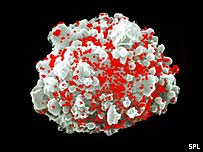Researchers compared AIDS samples from the 80s and 2000s, and their observations indicate that the virus may be multiplying more slowly and has become more sensitive to drugs

The virus that causes AIDS may be less powerful, researchers say. A team from the Antwerp Tropical Disease Study compared HIV samples from 1986-89 with those from 2002-2003.
They found that the new samples do not reproduce as well, and are much more sensitive to drugs - some other studies have shown that they actually increase their resistance.
The researchers, who wrote in the scientific journal dedicated to the AIDS disease, claim that their work is not intended to harm efforts to reduce the spread of AIDS. "HIV is still a disease that causes death," says Keith Alcorn, one of the researchers.
They were only able to compare 12 samples from each period, and it was not possible to completely filter out the possible effect of the drug treatment.
One of the researchers, Dr. Eric Ertz, said: "This was a very preliminary study, but we certainly found some surprising findings, indicating that the viruses of the 2000s are much weaker than those of the 50s. Undoubtedly, the virus is still deadly, but the death rates may be decreasing. Maybe, in 60 or XNUMX years, we will find out that the virus no longer kills."
Keith Alcorn, senior editor at the charity NAM, which deals with information about the AIDS virus, said that until now the propaganda was that the virus would become more violent as more and more human carriers passed, but the latest research shows the opposite. "As it stands now, when the virus passes from person to person, the immune system of the previous carrier has already weakened it. It may be that as a result of this, in a few generations it will become less harmful. But we are still far from there."
Advertisement Dr. Marco Vittoria, an AIDS expert at the World Health Organization, said that other diseases such as smallpox, tuberculosis and syphilis (syphilis) showed similar weakening tendencies over time. "There is a natural tendency to reach a kind of balance between the interests of the carrier and those of the cause of the disease, to ensure the survival of both for a longer time," he said. However, Dr. Vittoria emphasized that the new findings must not cause a false sense of security. "This kind of change is not measured well enough in an interval of years, but only of generations." He also questioned the researchers' ability to draw firm conclusions from such a small study.
Will Notland, from the "Trans Higgins Foundation" charity, said: "The current study contributes to the discussion of a confusing and contradictory issue. Some studies show that AIDS samples from recent years are more sensitive to the drugs, while other studies claim that they are becoming more resistant. This study mainly adds to the proof that AIDS shows no signs of disappearing anytime in the near future.
Dr. Marco Vittoria, an AIDS expert from the World Health Organization, says that other diseases such as smallpox, tuberculosis and syphilis (syphilis) have shown the same trend of weakening over time.
"There is a trend in nature to reach a sort of equilibrium between the agent and its hosts, in order to ensure close survival for a longer period of time." said.
However, Dr. Vittoria says that the latest findings should not fool people and give them a false sense of security. "Such changes don't happen over years but over generations." He told the BBC. He also wondered whether it was possible to reach such far-reaching conclusions from a small study.
AIDS scientist
